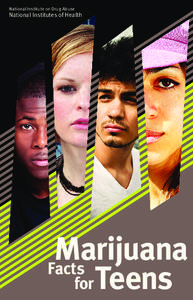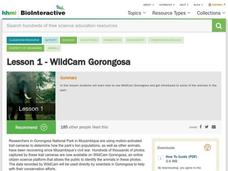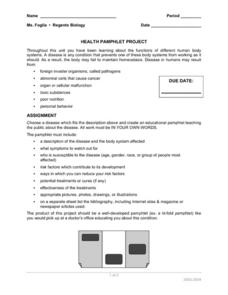Florida Center for Reading Research
Vocabulary: Word Meaning, Oh My Word!
Ever come across an unfamiliar word while reading and can't decipher its meaning? Use a worksheet and graphic organizer that tracks and helps bring meaning to unknown words as learners read a text. A worksheet and graphic organizer come...
Howard Hughes Medical Institute
Spreadsheet Tutorial 3: Column Graphs, Error Bars, and Standard Error of the Mean
There's absolutely no error in using the tutorial! Learners use spreadsheets to create column or bar graphs with error bars. They also learn how to calculate the standard error of the mean in the tutorial. This is the third installment...
NPR
The History of America’s Weed Laws
To understand the laws regarding marijuana use in the United States, you can go all the way back to the 1800's to learn about farming hemp, or you can go back to 2018 when California became the sixth state to legalize recreational...
National Institute on Drug Abuse
Marijuana Facts for Teens
Is marijuana addictive? Can you drive under the influence of marijuana? What happens if you smoke marijuana while you're pregnant? Teenagers learn the answers to these and many more frequently asked questions in an online booklet about...
Howard Hughes Medical Institute
Lesson 1: WildCam Gorongosa
Take a walk on the wild side! Episode one of an eight-part series of interactive lessons regarding Gorongosa National Park invites learners to become a part of the citizen science community. Scholars read a brief overview of the trail...
Mathematics Vision Project
Module 3: Numbers and Operations
Bring some concrete reasoning to the skills of multiplying and combining terms. Using various strategies, the six activities in the module provide practice for the skills of adding, subtracting, multiplying, and diving polynomials. The...
Shodor Education Foundation
Function Flyer
Fly through graphing functions with the Function Flyer. Young mathematicians use an interactive to graph different types of functions. A set of exploration questions has users investigate patterns in functions.
NASA
Water Rocket Launcher
How can you launch an object that isn't propelled by air? The resource provides directions to build a launcher to launch rockets made of two-liter bottles. The launcher, built mainly from materials found at the local hardware...
US Mint
Coin Connections
Help young mathematicians make cents out of the US currency system with this two-part math lesson. Children first learn the names and values for each type of coin, before learning to count and compare the values of coins using the...
August House
Stone Soup
Sharing and cooperation are difficult skills for kindergartners to grasp. Using the story Stone Soup and a series of activities, kids learn about the benefits of working together, categorizing and comparing items, and eating...
Explore Biology
Health Pamphlet Project
Biology or health nuts select a disease to research and produce a pamphlet that can be used to inform the public. The tri-fold product is worth 100 points according to the included grading page.
Arizona Department of Education
Introduction to Integers
Welcome to the backward world of negative numbers. This introductory lesson teaches young mathematicians that negative numbers are simply the opposite of positive numbers as they use number lines to plot and compare...
Collège Saint Charles Garnier
Coordinating Conjunctions (FANBOYS)
For, and, nor... Spend some time getting coordinating conjunctions just right with your class. Included here are three exercises to practice using these seven connecting words correctly; each worksheet includes a fun image and plenty of...
Agriculture in the Classroom
Six Kinds Do It All
Teach young engineers that all machines, no matter how complicated or complex, are made up of just six simple devices with this hands-on physical science lesson. Using the included templates, students first create paper models of...
Curated OER
Pudd'nhead Wilson: Concept Analysis
Learn all about the book Pudd'nhead Wilson with this analysis of the text. You can plan your unit with the useful teacher information provided here and use the project ideas to enrich instruction.
Scholastic
Spring Is Sprung: Water Movement in Plants
Young scientists use food coloring and celery stalks to determine how water travels through plants.
ESL Kid Stuff
Intro ESL Lesson (Ages 3-7)
If you are working on colors, printing names, introductions, and other projects in the first few weeks of school, use a series of activities designed for English language learners. It includes cute ways to wish your little ones...
EngageNY
Summarizing Bivariate Categorical Data
How do you summarize data that cannot be averaged? Using an exploratory method, learners complete a two-way frequency table on super powers. The subject matter builds upon 8th grade knowledge of two-way tables.
Practical Money Skills
About Credit
It's tempting to stay away from credit cards entirely, and it can also be tempting to charge large purchases on credit cards with the intention to pay them off later. But as a three-part lesson on credit and debt shows your high...
Wasatch County School District
Context Clues
Using context clues is an effective way to define unfamiliar words. Encourage elementary learners to look at the sentences around the word in question, with a short informative slideshow presentation.
EngageNY
Adding and Subtracting Expressions with Radicals
I can multiply, so why can't I add these radicals? Mathematicians use the distributive property to explain addition of radical expressions. As they learn how to add radicals, they then apply that concept to find the perimeter of...
Houghton Mifflin Harcourt
Unit 6 Math Vocabulary Cards (Grade 4)
In need of math vocabulary cards? Use a set of 66 vocabulary cards with topics focused mostly on geometry terms. Each sheet has two cards on it. The top half has the word printed in bold text, while the bottom half has the card with...
Charleston School District
Solving Equations by Combining Like Terms
How do you make these x's get along? Building on the previous lesson in the series, learners solve equations by combining like terms. The video uses objects to help pupils understand the concept.
Charleston School District
Solving Exponent Equations
Show your class that not all equations are linear. The lesson asks learners to solve simple quadratic and cubic equations using square and cube roots. Problems include equations with no solutions.
Other popular searches
- Addition Using Manipulatives
- Creating Art Using Music
- Chemical Change Using Apples
- Lessons Using Apples
- Multiplying Using Arrays
- Math Using Arctic Animals
- Addition Using Grouping
- Addition Using Unifix Cubes
- Adding Decimals Using Money
- Cultural Studies Using Math
- Add Fractions Using Pictures
- Addition Using Manipulative's























